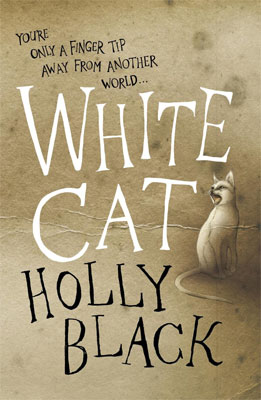White Cat

White Cat
The extraordinary new adult magic fantasy series from the author of The Spiderwick Chronicles.
Cassel is cursed. Cursed by the memory of the 14-year-old girl he murdered. Life at school is a constant trial. Life at home even worse. No one at home is ever going to forget that Cassel is a killer. No one at home is ever going to forget that he isn't a magic worker.
Cassel's family are one of the big five crime families in America. Ever since magic was prohibited in 1929 magic workers have been driven underground and into crime. And while people still need their touch, their curses, their magical killings, their transformations, times have been hard. His granddad has been driven to drink, his mother is in prison and his brothers detest him as the only one of their family who can't do magic. But there is a secret at the centre of Cassel's family and he's about to inherit it. It's terrifying and that's the truth.
Holly Black is the co-creator of The Spiderwick Chronicles. A New York Times No. 1 bestselling phenomenon, the series has been described as 'vintage Victorian fantasy' and has been made into a hugely successful film. The books have been translated into 32 languages.
White Cat
Hachette Australia
Author: Holly Black
ISBN: 9780575096707
Price: $55.00
Interview with Holly Black
Why do you choose to write fantasy novels?
Holly Black: I write the kind of novels that I like to read - and I've always loved fantasy. I think it gives us an opportunity to talk about a lot of stuff that matters, but in a new way. For example, we all get angry, and when we get angry we worry we might say something or do something to hurt people we care about. And then you have a creature like a werewolf who transforms into a monster and attacks the people closest to it. The focus of the story changes. We are still talking about anger, but by actualizing the metaphorical, we're talking about it differently.
Where did the idea for the book, White Cat come from?
Holly Black: I've loved con films, heist films and noir for a long time. So I knew I wanted to write about a kid who came from a family of con artists and I knew that I wanted.
And then I was thinking about magic and the way that in novels magic is organized and institutionalized. You have this idea of solitary wizards like Gandalf, you have magic schools, like Harry Potter attends, you have lots of books where a wizard teaches one or more students in a pseudo master and apprentice medieval model. So I was thinking about other models and I thought:
Well...what if magic worked like organised crime.
So from there I came up with this alternate history where there has always been curse magic. Less than one in a thousand people have the ability. There are seven types of curse magic: luck (which is what most people have), dreams, physical or body cursing, emotional curses, memory, death, and transformation (which almost no one has). In 1929, magic was outlawed in the US and like Prohibition led to the rise of the five big crime families in New York, the ban on curse magic led to all magical power being controlled by the mob.
White Cat takes place in an alternate now and concerns a kid named Cassel. He's not a curse worker himself, but he comes from a family of curse workers and grifters. He also has a memory of killing his best friend, Lila, when they were both fourteen. When he wakes up on the roof of his dorm room with no idea how he got there, he starts to realize that maybe his memories are hiding more than they're revealing. He has to investigate his past and figure out who he really is and what he's really done.
How much of your inspiration comes from real life and real people?
Holly Black: I read a lot of memoirs of people who'd grown up in criminal families and I borrowed lots of details from real life, but none of the characters are mapped onto any specific people.
What is the best thing about creating a family who are one of the big five crime families in America?
Holly Black: Well, it's a lot of fun to create a whole new history of organised crime on the East Coast of the US and a whole new idea of who the big crime families are. I was particularly influenced by the criminal organization of Los Angeles during 1930s-1960s because mobsters then and there were a lot less dynastic and a lot more motley.
Are readers able to relate to the difficult family life, experienced in this book?
Holly Black: On one hand, I think the idea of figuring out one's own identity outside of one's family, questioning the values of the people one has grown up with and coming to an individual sense of morality is pretty universal. On the other, I think growing up in a family of grifters and being deceived extensively by one's own family is very specific. Ideally, there are parts that will feel very familiar to readers and that will make the other parts compellingly strange.
MORE



